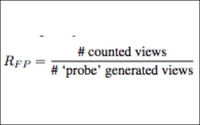 Experts in computer networks from four
research institutions have found that Google charges brands for advertisements served on YouTube even when the video platform's fraud-detection systems identify that a viewer is a robot rather
than a human being.
Experts in computer networks from four
research institutions have found that Google charges brands for advertisements served on YouTube even when the video platform's fraud-detection systems identify that a viewer is a robot rather
than a human being.
The study -- "
Understanding the
detection of fake view fraud in video content portals," first reported by the
Financial Times, was conducted by UC3M, Imdea, NEC Labs Europe and Polito. It evaluated the
performance of the fake view detection systems of five major online video portals, including Google YouTube and Vivendi's Dailymotion.
Dailymotion discounts a larger number of fake views from
monetization, but still delivers poor performance, since roughly three out of each four fake views are monetized. When researchers sent bots to visit two videos 150 times, YouTube's public view
counter identified just 25 of the views as real. AdWords, Google’s service for advertisers, charged the researchers for 91 of the bot visits.
advertisement
advertisement
Nonetheless, the results show that
YouTube’s detection system significantly outperforms all others, but still remains susceptible to attacks.
More than half of advertising agency executives focus at least some of
their clients' digital ad spend on video ads, but many remain unsure about how much return will come from those investments, according to eMarketer, which cites numbers from Strata.
Strata polled professionals at U.S. ad agencies in July 2015 and found that 56% put client budgets toward digital video ads, but 40% of those surveyed said they were unsure whether they got a
good return on investment from the digital video ads they had purchased. Another 5% thought they didn't get a good return at all.
The issue around fraud surely dampens returns on
investments a bit more, but more than that, findings from the study demonstrate the detection systems at companies like YouTube and Dailymotion put the "burden of the risk on the advertisers, who
pay to get their ads displayed."